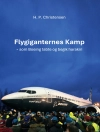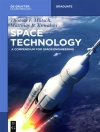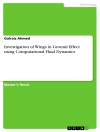This book presents the latest researches on hypersonic steady glide dynamics and guidance, including the concept of steady glide reentry trajectory and the stability of its regular perturbation solutions, trajectory damping control technique for hypersonic glide reentry, singular perturbation guidance of hypersonic glide reentry, trajectory optimization based on steady glide, linear pseudospectral generalized nominal effort miss distance guidance, analytical entry guidance and trajectory-shaping guidance with final speed and load factor constraints. They can be used to solve many new difficult problems in entry guidance. And many practical engineering cases are provided for the readers for better understanding. Researchers and students in the fields of flight vehicle design or flight dynamics, guidance and control could use the book as valuable reference.
Jadual kandungan
Introduction.- Mathematical Fundamentals.- The Mathematical Model for Hypersonic Entry Glide Vehicle.- Mathematical description of optimal control problem for entry gliding.- Indirect approch to the optimal glide trajectory problem.- Direct Method for Gliding Trajectory Optimization Problem.- The Concept of Steady Glide Reentry Trajectory and the Stability of its Regular Perturbation Solutions.- Analytical Solutions of Steady Glide Reentry Trajectory in Three Dimensions and their Application to Trajectory Planning.- Trajectory Damping Control Technique for Hypersonic Glide Reentry.- Steady Glide Dynamic Modeling and Trajectory Optimization for High Lift-to-Drag Ratio Reentry Vehicle.- Singular Perturbation Guidance of Hypersonic Glide Reentry.- 3-D Reentry Guidance with Real-Time Planning of Reference with New Analytical Solutions Based on Spectral Decomposition Method.- Omnidirectional Autonomous Reentry Guidance Based on 3-D Analytical glide Formulas with the Consideration of the effects of the Earth’s rotation.- Analytical Entry Guidance based on Steady Glide.- Linear Pseudospectral General Nominal Effort Miss Distance Guidance Method.- Linear Pseudospectral Adaptive Flight Phase Segmentation General Nominal Effort Miss Distance Reentry Guidance.- Trajectory-Shaping Guidance with Final Speed and Load Factor Constraints.
Mengenai Pengarang
Wanchun Chen is a Professor and Doctoral Supervisor of Beihang University, Beijing, China. He received B.E. and M.E. in flight vehicle design and Ph.D. in flight dynamics and control from Beijing University of Aeronautics and Astronautics (now named Beihang University) in 1986, 1989 and 1995, respectively. His research interests are in the area of flight dynamics, guidance and control of aerospace vehicle, aerospace vehicle integrated design and analysis.
Hao Zhou is a Lecturer and master’s Supervisor of Beihang University, Beijing, China. He received B.E. in aerodynamics from National University of Defense Technology and Ph.D. in flight vehicle design from Beijing University of Aeronautics and Astronautics (now named Beihang University) in 1998 and 2006, respectively. His research interests are in the area of flight dynamics, guidance and control of aerospace vehicle, aerospace vehicle integrated design and analysis.
Wenbin Yu is an Associate Professor and Doctoral Supervisor of Beihang University, Beijing, China. He received B.E. and Ph.D. in flight vehicle design from Beihang University in 2010 and 2016, respectively. His research interests are in the area of flight dynamics, guidance and control of aerospace vehicle, aerospace vehicle integrated design and analysis.
Liang Yang is a Lecturer and master’s Supervisor of Beihang University, Beijing, China. He received B.E. in mechanical engineering and automation from Hunan Agricultural University and Ph.D. in flight vehicle design from Beihang University in 2008 and 2016, respectively. His research interests are in the area of flight dynamics, guidance and control of aerospace vehicle, aerospace vehicle integrated design and analysis.












